#localizations and translation decisions are FASCINATING
Explore tagged Tumblr posts
Text
Lwaxana: takes off wig
English Odo: It’s fine
French Odo: It’s very pretty
Me: 👀
#French trek#ds9#Odo#lwaxana troi#I’m mostly joking#this is 100% becoming my weird note taking space as I go through ds9 in French#localizations and translation decisions are FASCINATING#Trek Translation#there there’s the tag for my translation notes#in case Void would like to look at it with me#you never know#maybe I’ll make someone’s day#anyway Odo and Lwaxana’s weird little friendship is very precious to me and this was a fun little thing I noticed#Star Trek
20 notes
·
View notes
Text
favorite FE localization i've discovered is duessel from sacred stones. he's called duenell in the german version, probably because "dussel" means moron
#feli speaks#finally a localization change i can understand#i'm still questioning daraen. or lon'zu. listen man we also have the letter q in german#it's also FASCINATING that PAL versions of archanea games use the ''old'' translations#it's so wack like. the german names for binding blade are also the ''old'' romanizations before the official english names came#like in heroes it's still biran and not bern#i'm captivated by the decision making process here#FE german localizers i want to study you
5 notes
·
View notes
Text
My Ideal Environmental Interpreter Role: Unit 2 Blog Post
Hey everyone! This is a fun prompt and I can't wait to hear what your roles are!
What is an Environmental Interpreter?
Environmental interpretation is crucial to give people a better understanding of how ecosystems are interconnected, enabling us to make decisions that are good for the environment. This job is important for raising awareness of environmental issues and encouraging sustainable practices. If I were an environmental interpreter my ideal role would blend education, creativity, and community engagement to inspire awareness and action. I want to create a place where people with a shared love of nature can come explore their curiosity while learning from others.
Where might my role be?
My ideal role would be by the ocean, maybe in Hawaii or somewhere in the Caribbean. I find the ocean and aquatic ecosystems so fascinating and somewhere like Hawaii provides a fusion of a rich cultural past and thriving marine habitats. I think there would be many opportunities for learning and interpretation amid the changing environments of coral reefs, coastal forests, and volcanic landscapes. I would be able to incorporate traditional ecological knowledge into my work thanks to Hawaii's close ties to Indigenous customs and ecological care, providing a comprehensive and significant experience.

Who wouldn't want to work with this view- peep the nurse shark
What would my role entail?
If I was curating my ideal role as an environmental interpreter it would entail creating immersive, interactive experiences that make marine and coastal ecosystems accessible and engaging. Leading snorkeling tours on the coast, conducting educational workshops, cleaning up the beach, and creating interpretive signage that showcases my findings about local species are a few examples of things I would be so fulfilled by. Simply ending the day on the beach looking at the ocean is one of the most calming things and doing that for work would be a dream. Currently, I am studying sociology and biology in hopes of becoming a teacher so I would love to incorporate children into my work by sharing my research in schools. The lecture emphasizes “sharing what you care about” in hopes of inspiring others and by introducing these ecosystems to children I would hope to spark the same love for the ocean in some of them that I have.

Snorkelling through a coral reef on Turks and Caicos Island
Conducting and integrating research is not only an important part of this role but can also play a crucial part in reminding us how our actions are affecting ecosystems. This could involve looking at research on coral bleaching, keeping an eye on the condition of nearby reef systems, or following the movements of marine life. Using this knowledge, I could create programs that represent environmental issues and solutions, to give tourists, locals, and researchers accurate and useful information.
What skills would be needed for this role?
To excel in this role some of the skills I may need include technical expertise, interpersonal abilities, and cultural awareness. The capacity to translate scientific concepts into language that appeals to a wide range of consumers would be crucial, and I hope to learn more ways to do this in this course and other biology courses I take. Ecology was one of my favourite classes I have taken at Guelph, and it is the first class I was asked to complete fieldwork for. It was very interesting and helped me learn the proper way to conduct research that I can apply to other aspects of my degree. Creativity would also be an important skill particularly when creating engaging educational materials for children or finding unique ways to share research whether it be through photographs or journals. One of the most important things I would keep in mind is cultural awareness, especially if I were to conduct research in Hawaii, where Indigenous culture and customs are closely linked to the water.

Iguana found on "Iguana Island", Turks and Caicos
Are there setbacks?
This job sounds amazing, yet in a changing world, it is inevitable to experience things like plastic pollution and coral bleaching in aquatic ecosystems. These setbacks can however provide an opportunity for involvement. Careful planning and negotiation are needed to strike a balance between conservation objectives and the demands of tourism. Encouraging group action is especially important in these communities and I would plan neighbourhood based marine conservation initiatives, enabling tourists and residents to collaborate to protect the ecosystems that we know and love- because who doesn’t love dolphins and turtles.
My ideal role as an environmental interpreter would combine activism and education meaningfully linking people with the ocean. Whether leading snorkelers through a coral reef or sharing research, my objective is to preserve the ocean and the beautiful creatures that come with it!
-Sophie
5 notes
·
View notes
Text
"Turner" to "Tana": a fun FE8 localization story
for a long time, i've been fascinated with how characters' name are changed between the Japanese and English scripts of various FE games. contrary to what many others say, i do think the folks who've localized FE over the years have done a pretty great job (with some Fates-shaped exceptions) and do make an effort to retain the spirit of the Japanese scripts in their translations. i think that care and attention to detail is especially obvious when looking at how they localize character names. these efforts, however, are often overlooked by western fans. so i've made it my mission to bring some recognition to the complex issue of character name localization with a mini series on this blog.

let's start with everyone's (second) favorite FE8 pegasus knight and one of Eirika's many girlfriends; Tana! In Japanese, Tana's name is
"ターナ", or "Turner."
This is just one little factoid I am obsessed with. Like, Turner? idk why but that name really really works for her! when i hear "Turner", i immediately think of it as a surname. but it works surprisingly well as a feminine given name imo. it's super fun and unique and quite cute. you can even see the logic behind it a bit; pegasi turning in the air as they race across the battlefield. the name's got a frantic energy to it, a verve that I love and that fits her well!
when translating FE8, "Turner" became "Tana." I think this was bound to happen, as to an English-speaking audience, "Turner" is mostly recognized as a surname, rather than a given name. in the few cases where "Turner" is used as a given name, it's got a distinctly masculine connotation among English speakers. And honestly, I think there's a non-zero chance that The Fairy Odd Parents influenced this decision too. that was one of the most popular kids' shows on TV at the time. if you asked the average English-speaking kid from the 2000s what they think of when they hear the name "Turner", I guarantee you 99% would immediately reply "TIMMY TURNER!"
so, it's "Turner" -> "Tana" in the English translation, which also works on so many levels. first off, "Tana" is not only a real name actual people actually have, but I feel like it's got the same "vibe" as a girl named Turner; it's got that energy, that spunk, etc. but also, "Tana" is pretty much a transliteration of the Japanese way of pronouncing "Turner." so overall, a great decision. a very seamless and elegant localization. they didn't totally sanitize the intent and originality of the Japanese name, yet they also avoided a cruel fate where the English side of the FE fandom makes endless jokes calling Tana "Timmy Turner" for years on end. truly a job well done.
(as a little epilogue to this story, I wanted to note, "Tana" became "Dana" in the Italian translation of FE8, which is great. Dana fits her very well too imo. another W for the FE translation team.)
tune in next time, where we discuss Fates, Iago, Macbeth, Othello, and The Kindaichi Case Files...
(all info above sourced from the NIWA FE Wiki: https://fireemblemwiki.org/wiki/Tana)
#fire emblem#fire emblem sacred stones#fire emblem the sacred stones#tana fire emblem#eirika fire emblem#gameboy advance#translation#localization
2 notes
·
View notes
Text
oh no, i'm such a translation/localization freak. I'm so fascinated by the whole process of localization for foreign media because of the tough job of making certain jokes hit in a diff language, making another country's social norms/traditions understandable to another country that has no equivalent of said norms, havin to figure out what slang is similar to the original language's slang OR the tricky biz of completely rewriting dialog because turns out that in the country this thing is gonna be released in, doing/saying/implying certain thangs is a big no no (even if that thang is completely benign in the original work's country of origin)
So oh no
oh no i read (bits and pieces i could find online) of the The Ghost in the Shell 2004 Dark Horse print, then bought the GITS 1 Deluxe Edition manga and was fascinated by some of the translation decisions and then i found out there was a dark horse english 1995 8 volume release originally? Oh and theres a Bilingual Edition that-

-looks like this? Came out in 2002?
This isn't even about liking Ghost in the Shell that much, this is about reading lots of different translator's work on the exact same source material and seeing all the different choices they make
so oh no i'm gonna probably have no will power and buy a bunch of the same comic
#ghost in the shell#ghost in the shell manga#translation#localization#japanese language#english translation#oh no
2 notes
·
View notes
Note
Helloooo... I hope I won't bother you asking this but I heard that in the jpn version of Veyle's diary it's precised she is the only of Alear's sister ?
It's no bother to me at all! The ally notebooks are proving to be one of the most fascinating cases to study in Engage - my guess is the localization team had to make a number of compromises to 'accuracy' of translation due to the limited space on each page.
So here's Veyle's first page, where we will find the answer to your question:
The Japanese sentence does indeed include 'yuiitsu', which decisively means 'one and only.' Immediately sparks some confusion, because we know Sombron had a lot of children, but the next word immediately clears that up - it's 'imouto' - younger sister. In Japanese, 'younger sister' and 'older sister' are each their own unique word (same for brother btw). So it doesn't take up any extra space in Japanese to specify older vs. younger, creating a tricky problem in English localization when the number of characters in a text box is limited.
That makes this make sense - Alear has Veyle as their one younger sister, and they can still have any number of older sisters.
Update 11/30: A couple of readers chimed in to point out that the game clearly states in Chapter 24 that Alear did indeed have at least one other younger sister, who was killed by Corrupted. So the ally page says "one and only" within the context of Alear's surviving siblings, who is only Veyle by the time the events of the Engage happen.
------------------
There's also a few other things to note about Veyle's pages, while I am here. The information cut due to space limitation does not end with just this one case!
Link to JP notebook pages on the Pegasus Knight Wiki
Pg. 1:
The sentence about Veyle defeating her evil side was longer in Japanese: ソンブルの策略により敵対したが、(She was an enemy due to Sombron's scheme, but) ヴェイルの意志で悪しき己を撃破。(defeated her evil side by her own will.)
Pg. 2:
None, localization is a straightforward translation.
Pg. 3:
The Japanese further details that her Corrupted are very complex / advanced / intelligent compared to the standard zombie-like Corrupted: 【特技】精巧な異形兵を作ること ((Talents) Creating intelligent Corrupted Her background mentions that she was born in Gradlon, and was alone for the past 1,000 years. 【来歴】グラドロンの地で生を受け ((Background) Born in Gradlon,) 邪竜の御子たちの末妹として育つ。(raised the youngest of the Fell Dragon's children.) 母は優しき心を持つ魔竜族だった。(Her mother was a mage dragon with a kind heart.) 千年の時を孤独に過ごし、父親に (She spent 1,000 years alone, and her father) 駒として扱われ望まぬ戦を重ねたが、(made her fight against her wishes over and over again as his pawn, but) 善良な心を失うことはなかった。(she never once lost her pure heart.)
Pg. 4:
JP also describes her as shy: 遠慮がちだが本当は大の遊び好き。(She is shy, but also very playful.) And there was also more to the sentence about her wanting to be useful to people: 人の役に立つことを何よりも望み、(She wants to be useful to people more than anything, 困っている人は放っておけない。(cannot ignore a person in need.)
Pg. 5:
The JP line about the Pact Ring also mentions that she treats it as her most valuable amulet / charm, as she did with the dragonstone.
(I took a screenshot of the page on YouTube, due to it not being on Pegasus Knight.)

--------------------------------------
Full English localization:
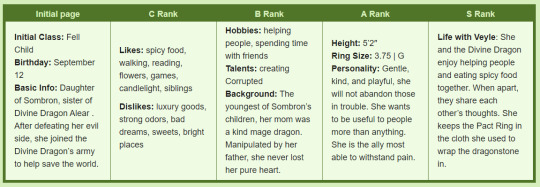
#fire emblem#fire emblem 17#fe17#fe#fire emblem engage#fe engage#nintendo#switch#nintendo switch#japan#japanese#localization#translation#alear#veyle#ally notebook
32 notes
·
View notes
Note
1, 8, 9, 10, 12, 20.
1. What are you reading now?
Not much, I'm sorry to say. Not any particular book, I mean.
I'm feeling the call of autumn approach swiftly, and with that, certain favorite poets of mine seem seasonally appropriate. My reason for this is none other than a subjective association I've made over the years, and perhaps a touch of imagistic relevance.
Gottfried Benn is one--a sort of contemporary of Eliot, and while my knowledge of German literature and poetry is lamentable, in translation he reads as a modernist, with a more sarcastic bite.
Another is Rilke, whose work I've known a little longer than Benn's. Rilke is decidedly Romantic and "soft" in a sheltered sort of way, though his poetic prowess is masterful. As an aside, Benn was critical of Rilke and his, shall we say, privileged mode of living: "... in the end, everything comes up roses, another castle is found, from where he addresses the poor, hears god, and ruffles the poultry coop..."
My, my... quite an assessment. One I'm not altogether contesting but rather, it doesn't make much difference to be critical of the dead--they cannot defend themselves nor can we hold them accountable in a proper court of law, and much less hold their conduct as a personal slight against later generations. In short, Rilke, the man and "repository of great poetry," is dead--what issue I (or others) may have with his human behavior is no one's business but God's alone. Of course, we must be critical of the work as it is, and its standing within the literary canon. Separate then, the artist from his art, otherwise one will run the risk of having to contend with an awful lot of knotted knickers.
Back to my point--Rilke is lovely if you want to experience a quasi-mystical elopement from reality into a hazier, soft-edged realm (much like those misty autumn days I fondly recall), but Benn is a sharper, more piquant view from middle-age, where cynicism keeps disappointment at arm's length (like the brisk air on a crisp autumn morning).
To keep a proper balance, I'm reading a bit of both. Below is one poem from Gottfried Benn (in a translation by Michael Hofmann), one I've shared before, but this includes the original German as well.

8. Name something you are looking forward to?
I haven't thought much of looking forward to anything recently. What a sad thing to admit...
If there must be something, I'm looking forward to the next community day in Pokémon GO at the end of this month. I've been playing since 2020, and it's one of the only things that keeps me sane as I go out of the house. GO is a little distraction from all the noise and commotion in the world, and I can catch and interact with charming digital creatures and continue a part of my childhood that never got to develop at the time.
9. What are you craving right now?
Decisively, a Racine Kringle, preferably a spiced variety.
Trader Joe's used to stock them regularly but for the past several months those sinfully delicious desserts have been curiously absent from the shelves.
I would order it online (from my home state of Wisconsin, where this particular pastry originates) but the usual price is $25(!) and that's without shipping costs, compared to $10 when it's at the local Trader Joe's.
I suppose this may be as good a time as any to finally learn how to make it myself, as I've been saying for years.
10. Favorite animal?
Oh, now this is too difficult for me to choose only one--I am an ardent animal lover and I once had aspirations to become a biologist in my youth, so all animals find a way to my heart in some way or another.
I'm thinking at this very moment birds--in all their beauty and variety--are my favored animal. Birds have a strong personal symbolism for me, as well as artistic significance (many of my poems feature birds, and avian motifs have made their way into my musical composition).
And perhaps more than any other zoological family, birds fascinate me above all other creatures. Color alone is enough but then there are so many shapes, sizes, habits, and *then* there's bird song, and with that, another beautiful aspect of these delightful animals. Indeed, I'm grateful to be witness to these marvels of Creation.
12. Favorite comfort drink?
I've heard of comfort food but never comfort drink... I suppose tea, in certain blends, is a comfort drink for me. Some teas I reserve for specific seasons, and others hold strong meaning within my memory.
Lapsang Souchong is a tea I prefer in the autumn and early winter season. The same goes for any herbal tea with a good dose of cinnamon. The smokiness of one and the warming spice of the other make for cozy cups to sip on chill days and are especially soothing in the evening after dinner.
20. Share a recipe or two?
Again, a difficult decision. However, I wish to share a recipe I've been using for the past 15 years or so. It's a crêpe recipe from Julia Child's book, The Way to Cook. I'm sharing a photo of the page on which the recipe is found, since there is another for dessert crêpes as well.
I enjoy these particular pancakes as an occasional treat, and I especially like them with a smattering of lingonberries. Come to think of it, if I recall correctly, I first tried this recipe a day in August those years ago.

Thank you kindly for your questions, it has been my pleasure answering and sharing them with you--M
1 note
·
View note
Text
Learning Japanese for Beginners — A Complete Guide to Getting Started
Are you ready to embark on an exciting journey into the world of Japanese language and culture? Whether you’re interested in anime, sushi, or simply want to challenge yourself with something new, learning Japanese offers a unique experience. Imagine being able to read your favorite manga in its original form or hold conversations with locals during your travels in Japan. The possibilities are endless.
Japanese is not just a language; it’s a gateway to understanding an entire culture rich in history and tradition. With its intricate characters and sounds, it can seem daunting at first. But don’t worry! This guide will help you navigate the essentials of learning Japanese from scratch. Let’s dive into why picking up this beautiful language could be one of the best decisions you’ll ever make!
Why Learn Japanese?
Learning Japanese opens up a world of opportunities. It’s not just about the language itself; it’s a gateway to understanding an entirely different way of life.
Japan has a rich history and culture that captivates millions. From its traditional art forms to cutting-edge technology, knowing the language can enhance your appreciation for these elements.
If you enjoy anime or video games, being able to understand Japanese allows for deeper immersion. You’ll catch nuances and humor that often get lost in translation.
For those considering travel, speaking Japanese can significantly enrich your experience. Navigating cities becomes easier, and you’ll connect with locals on a more personal level.
In today’s global economy, Japan is a significant player in various industries. Proficiency in Japanese can open doors in business and career advancement as well.
Benefits of Learning Japanese
Learning Japanese opens doors to a rich cultural experience. Japan boasts a unique blend of tradition and modernity, from its ancient temples to cutting-edge technology. Understanding the language allows you to dive deep into this fascinating culture.
Career opportunities also expand significantly with Japanese skills. Many businesses seek bilingual employees, especially in industries like technology, gaming, and travel. Speaking Japanese can set you apart from other candidates.
Traveling in Japan becomes much more enjoyable when you can communicate in the local language. Navigating cities or ordering food at restaurants feels less daunting when you’re familiar with basic phrases.
Moreover, studying Japanese enhances cognitive abilities. Learning a new script challenges your brain and improves memory retention while boosting problem-solving skills through complex grammar structures.
Connecting with native speakers fosters friendships that enrich your life experiences beyond just language learning. Enjoy meaningful conversations and build lasting bonds as you share stories across cultures.
Getting Started: Basic Phrases and Expressions
Starting your journey in Japanese can be exciting. Learning a few basic phrases opens up new possibilities for conversation.
Begin with greetings. “Konnichiwa” means hello, while “Arigatou” expresses gratitude. These simple words are the building blocks of communication.
Don’t forget about asking questions. Phrases like “Eigo o hanasemasu ka?” translates to “Do you speak English?” This is invaluable when navigating unfamiliar situations.
Practice polite expressions as well. Saying “Sumimasen,” meaning excuse me or I’m sorry, shows respect and consideration in social interactions.
Remember to ask for help if needed — “Tasukete kudasai” means please help me. It’s an essential phrase that fosters connection with native speakers.
With these tools at hand, you’re ready to embark on engaging conversations and dive deeper into the language!
Understanding the Japanese Alphabet
The Japanese writing system is unique and fascinating. It consists of three scripts: Hiragana, Katakana, and Kanji. Each serves a distinct purpose.
Hiragana is the foundation for beginners. It’s used for native Japanese words and grammatical elements. Learning these characters will help you read basic texts effortlessly.
Katakana focuses on foreign words, names, and loanwords from other languages. It’s essential for understanding modern vocabulary in Japan.
Kanji represents ideas or concepts through complex symbols derived from Chinese characters. While challenging to master, knowing some kanji greatly enhances reading comprehension.
Start by familiarizing yourself with Hiragana first; it lays the groundwork for everything else. Practice daily to build muscle memory and recognition skills.
Incorporate visual aids like flashcards or apps into your study routine to make learning engaging and effective. With dedication, you’ll find that each character unlocks new facets of the language.
Tips for Learning Japanese Pronunciation
Pronunciation can be tricky when learning Japanese, but it’s essential for clear communication. Start by listening to native speakers. Podcasts, songs, and movies can help you tune your ear to the sounds.
Practice speaking aloud often. Mimic what you hear. Pay attention to pitch accents; they can change meanings drastically in Japanese.
Record yourself reading simple sentences or phrases. Listening back helps identify areas where you may need improvement.
Use language apps that focus on pronunciation drills. They often provide instant feedback on your spoken words.
Don’t shy away from tongue twisters! These fun exercises challenge your mouth muscles and improve clarity.
Consider joining a conversation group or finding a language partner for real-time practice. Speaking with others builds confidence and sharpens skills quickly.
Essential Grammar Rules to Know
Understanding Japanese grammar is crucial for effective communication. Unlike English, Japanese often follows a Subject-Object-Verb order. This means the verb typically comes at the end of a sentence. Adjusting to this structure can take some practice.
Particles play an important role in Japanese grammar. These small words indicate the function of nouns in sentences. For example, “は” (wa) marks the topic, while “を” (o) signifies the object of an action.
Another key point is verb conjugation. Verbs change forms based on tense and politeness levels. Mastering these variations allows you to express yourself accurately.
Don’t forget adjectives! They also require conjugation and can even act as verbs in certain contexts, adding richness to your speech.
Learning these essential rules will significantly enhance your understanding and use of the language as you progress on your journey.
Common Challenges and How to Overcome Them
Learning Japanese can be an exciting journey, but it’s not without its hurdles. One common challenge is the complexity of kanji. With thousands of characters to memorize, it can feel overwhelming. A good strategy is to start with frequently used kanji and practice them daily.
Another obstacle is pronunciation. Japanese has sounds that may not exist in your native language. Listening exercises and practicing with native speakers can greatly improve your skills.
Grammar presents its own set of difficulties, especially word order and particles. Breaking down sentences into smaller parts helps clarify how they function together.
Maintaining motivation can be tough when progress seems slow. Setting small goals and celebrating milestones keeps the excitement alive while helping you stay on track for long-term success in mastering this beautiful language.
Resources for Learning Japanese
When diving into the world of Japanese, having the right resources can make all the difference. There are countless apps designed specifically for language learners. Duolingo and Rosetta Stone are popular choices that offer structured lessons.
For those who prefer a more traditional approach, textbooks like “Genki” provide comprehensive coverage of grammar and vocabulary. These books often come with exercises to practice what you’ve learned.
Online platforms such as YouTube host channels dedicated to teaching Japanese. Creators share engaging content, from vocabulary lists to cultural insights.
Podcasts also serve as valuable tools for immersive listening experiences. Try ��JapanesePod101” or “Nihongo Con Teppei.” They cater to various proficiency levels and help improve your auditory skills.
Consider joining local language exchange groups or online communities where you can practice speaking with native speakers and fellow learners alike.
Final Thoughts and Next Steps
Learning Japanese can be an exciting journey filled with discovery and cultural enrichment. As you embark on this path, remember to celebrate small victories along the way. Whether it’s mastering a phrase or recognizing a character in writing, each step counts.
Consider setting realistic goals for yourself. Maybe focus on daily practice or dedicate specific times of the week to learning. Consistency is key when acquiring any new skill.
Utilizing various resources — like language apps, online courses, or local conversation groups — can enhance your experience significantly. Surrounding yourself with native speakers will also boost your confidence and improve your conversational skills more than you might expect.
As you dive deeper into the language, don’t shy away from making mistakes; they are part of the learning process. Engage actively with media like anime, music, and literature to immerse yourself further in Japanese culture while reinforcing what you’ve learned.
Keep exploring different methods until you find what works best for you. The world of Japanese language and culture is vast and rewarding; take your time discovering its nuances at your own pace.
With determination and creativity in how you approach learning, you’ll not only gain proficiency but also develop a genuine appreciation for Japan’s rich heritage as well as its modern vibrancy.
#Learning Japanese#learning japanese for beginners#learn japanese online free#best way to learn japanese online
0 notes
Text
What makes consumers tick when it comes to seafood?

In a world where culinary choices reflect not just taste preferences but also ethical considerations, health awareness, and cultural identity, seafood stands as a fascinating study in consumer behaviour. From the pristine catches of the bestIndian Ocean tuna to the everyday frozen fish sticks, seafood consumption patterns tell us much about what drives our decisions at the market or restaurant. But what truly makes consumers tick when it comes to these treasures from the deep?
The Sensory Experience: More Than Just Taste
When consumers approach the seafood counter, a complex sensory evaluation begins – often unconsciously. The glistening appearance of fresh fish, the firm texture that springs back when pressed, and the clean ocean scent all contribute to our perception of quality. For seafood processing companies, understanding these sensory triggers is crucial to maintaining product appeal throughout the supply chain.
"People eat with their eyes first," explains marine food scientist Dr. Emma Richards. "We have found that consumers associate certain visual cues with freshness ��� bright red gills, clear eyes, and in the case of fillets, a translucent quality that suggests it was recently harvested."
This sensory journey continues during preparation and consumption. The delicate flavour profiles, the transformative cooking processes, and even the sound of a perfectly seared scallop hitting the plate all contribute to the multi-sensory experience that seafood lovers seek.
Health Consciousness: The Wellness Factor
Health considerations rank among the most powerful motivators for seafood purchases. As nutritional research continues to highlight the benefits of omega-3 fatty acids, lean protein, and essential minerals found in seafood, many consumers view these products as investments in their wellbeing.
"We are seeing a definite correlation between increased awareness of seafood's health benefits and purchasing patterns," notes consumer behaviour analyst Sarah Mendez. "Particularly among Generation X and Millennials, there is a willingness to pay premium prices for high-quality seafood that is perceived as offering superior nutritional benefits."
This health-conscious approach extends beyond nutritional content to concerns about additives, processing methods, and preservation techniques. As a result, fish processing companies have begun emphasising their minimal intervention approaches and highlighting their commitment to preserving the natural nutritional profile of their products.
The Sustainability Equation
Perhaps no factor has transformed seafood consumption patterns more dramatically in recent years than sustainability concerns. Today's consumers increasingly demand transparency about where their seafood comes from and how it is harvested.
The Marine Stewardship Council reports that 79% of seafood consumers believe we should consume seafood only from sustainable sources, while 83% agree that we need to protect seafood for future generations. These values translate directly into purchasing decisions, with many consumers willing to pay more for certified sustainable options.
This shift has fundamentally altered how the industry operates. From traditional fishing communities to best yellow fin tuna exporters, sustainability certifications have become as important as quality assurance protocols. Companies now invest heavily in traceability systems that allow consumers to track their purchase from ocean to plate, often through smartphone apps that reveal the fishing vessel, method, and even the name of the captain who brought in the catch.
Cultural Connections and Tradition
While modern concerns about health and sustainability shape seafood consumption, cultural traditions continue to exert powerful influence over preferences. Regional cuisines that have evolved around local seafood resources create enduring consumption patterns that resist change.
In coastal New England, the ritual of the Friday fish fry remains a cultural touchstone that brings communities together. In Japan, specific fish species are associated with celebrations and seasons. In Mediterranean countries, entire cooking traditions have developed around the rhythms of daily fish markets.
These cultural connections create both challenges and opportunities for seafood marketers. While traditional preferences can be resistant to innovation, they also provide a foundation of loyal consumers and authentic storytelling opportunities that resonate with those seeking connection to culinary heritage.
The Convenience Factor
Despite growing interest in gourmet seafood experiences, convenience remains a significant driver of seafood purchasing decisions. The reality for many consumers is that fear of improper preparation, concerns about cooking odours, and uncertainty about selection create barriers to seafood consumption.
The industry has responded with innovations designed to address these barriers. Pre-marinated fillets, cooking instructions directly on packaging, meal kits with precisely portioned seafood components, and flash-frozen technology that preserves restaurant-quality products for home preparation all cater to the consumer seeking simplicity.
"Our research shows that even culinary adventurous consumers often feel intimidated by seafood preparation," explains food marketing specialist James Wong. "Companies that can remove that anxiety while maintaining quality perceptions capture significant market share."
Price Sensitivity and Perceived Value
While seafood often commands premium prices compared to other proteins, consumer response to these prices varies significantly based on perceived value. Value, in this context, represents a complex calculation involving quality expectations, portion size, convenience factors, and competitive alternatives.
Interestingly, studies show that price sensitivity decreases when consumers understand the story behind their seafood. A fish fillet with an anonymous origin faces strict price comparison with alternatives, while one with a compelling narrative about sustainable harvesting practices or support for traditional fishing communities often justifies a premium price in consumers' minds.
This storytelling approach has transformed marketing throughout the seafood industry, from restaurant menus that name specific fishing boats to retail packaging that features QR codes linking to videos of harvest methods and processing facilities.
The Trust Equation
Underlying all seafood purchasing decisions is the critical factor of trust. Food safety concerns, mislabelling scandals, and reports of illegal fishing practices have made many consumers wary. Rebuilding and maintaining trust have become a central challenge for the industry.
Transparency initiatives, third-party certifications, and rigorous testing protocols help address these concerns. Many leading seafood brands now embrace "radical transparency" approaches that reveal every aspect of their supply chain, recognising that today's consumers demand authenticity and honesty.
The Future of Seafood Consumption
As we look toward future trends in seafood consumption, several emerging factors are worth watching. Climate change impacts on ocean ecosystems, advances in aquaculture technology, and the development of plant-based and cell-cultured seafood alternatives all stand to reshape consumer preferences and options.
What remains constant, however, is the complex interplay of sensory experience, health considerations, ethical concerns, cultural connections, and practical factors that influence seafood purchasing decisions. Understanding these motivators allows both industry players and consumers themselves to make more informed choices about these precious resources from our oceans, lakes, and rivers.
For consumers navigating the ever-changing landscape of seafood options, asking questions, seeking out sustainable options, and being willing to explore beyond familiar species can lead to more satisfying and responsible choices. As our understanding of what makes consumers tick continues to evolve, so too will the industry that strives to meet these complex and evolving demands.
#fish processing companies#seafood processing companies#best Indian Ocean tuna#best yellow fin tuna exporters
0 notes
Text
Become a Teen Patti Master: Unlock the Secrets of the Game!
Teen Patti is more than just a card game—it's a cultural phenomenon that combines skill, strategy, and a dash of luck. Whether you're a seasoned player or a curious beginner, mastering Teen Patti can elevate your game and enrich your social experience. In this blog, we’ll dive into the fascinating world of Teen Patti and provide you with tips and insights to help you become a true Teen Patti Master.
The Allure of Teen Patti
Originating in India, Teen Patti (which translates to “three cards”) is a game steeped in tradition and excitement. Its fast-paced nature and strategic depth make it a favorite among card players worldwide. The simplicity of the game belies the layers of strategy involved—from calculating odds to reading opponents’ behavior. This delicate balance between chance and skill is what draws players back to the table time and again.
Why Strive to Be a Teen Patti Master?
Becoming a Teen Patti Master means more than just winning games. It involves understanding the nuances of the game, developing a keen sense of timing, and honing the art of bluffing. Here’s why many enthusiasts set their sights on mastering Teen Patti:
Enhanced Strategy: Mastery comes with learning the subtle strategies that can turn the tide of a game. Recognizing patterns, predicting moves, and making calculated risks are all part of becoming a formidable player.
Social Connection: Teen Patti is often played in group settings, making it an excellent way to bond with friends and family. A deep understanding of the game can lead to more engaging and competitive sessions.
Cultural Appreciation: By diving into Teen Patti, you connect with a piece of rich cultural heritage. The game has evolved over the years, yet it continues to hold a significant place in the hearts of many.
Tips to Elevate Your Teen Patti Game
1.Learn the Rules Thoroughly
Before you can master Teen Patti, it's essential to have a solid grasp of its rules and variations. Spend some time reading up on the official guidelines and understanding how different hands rank. This foundational knowledge is critical when you start to delve into more advanced strategies.
2.Practice Regularly
As with any game, practice is key. The more you play, the more comfortable you'll become with the flow and rhythm of the game. Consider joining local clubs, online forums, or even friendly home games to refine your skills.
3. Master the Art of Bluffing
Bluffing is an integral part of Teen Patti. Learning when to hold back and to push your luck can make all the difference. Observe your opponents’ habits and body language to detect any tells, and never reveal your true hand too soon.
4.Study Winning Strategies One of the best ways to improve your game is by studying the strategies of experienced players. Look for books, online tutorials, or even blogs that dissect the intricacies of Teen Patti. Over time, you'll develop your unique style that blends these insights with your intuition.
5.Stay Calm Under Pressure
A calm mind is your most potent tool during the game. Maintaining composure helps you make rational decisions even in high-stakes moments. Practice mindfulness or other relaxation techniques to keep your nerves in check when the game heats up.
Resources to Help You on Your Journey
For those looking to dive deeper into the world of Teen Patti, there are countless resources available online. Websites like Teen Patti Master offer a wealth of information—from detailed game rules and strategies to community forums where you can discuss tactics with fellow enthusiasts. Exploring such platforms can provide you with insights that are hard to find elsewhere and accelerate your journey to mastery.
Final Thoughts
Becoming a Teen Patti Master is an ongoing journey of learning and refinement. Whether you're in it for the thrill of competition, the joy of socializing, or the challenge of strategy, Teen Patti has something to offer everyone. So, shuffle the deck, trust your instincts, and step confidently into the world of Teen Patti. Your mastery of this captivating game awaits!
Happy playing, and may the cards be ever in your favor!
0 notes
Text
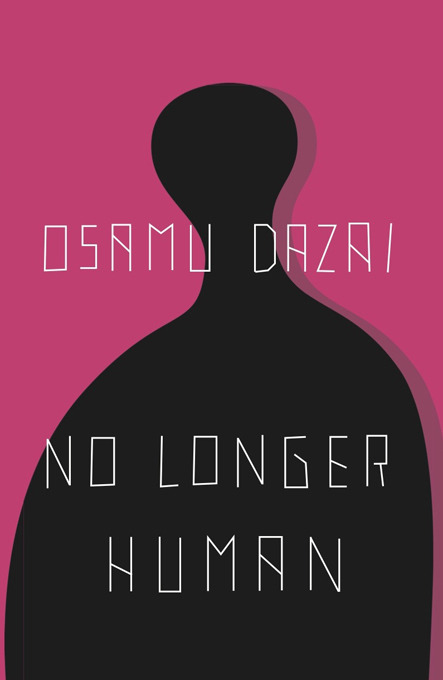
✮⋆˙ 01/14/2025
no longer human (osamu dazai)
in which we watch a traumatized clown's visceral spiral into despair. and then afterwards, oblivion. (💭10/10)
no longer human. now i'm not, and have never been, a book reader by any means. it's been probably 5 or so years since i last picked up an actual piece of literature. and finished it, even. but when i saw this title recommended to me in a local shopping app, something about it just called to me.. and not just because of my previous associations of this author to.. popular media figures in anime (i have never even finished bsd i am a fraud)
around that time, that was december of 2024... i was (and still am) was trying to scramble and look for art that could speak to me in some way (fun fact: this was how i came to watch good will hunting but wasn't impressed at all with how they handled trauma), and that title expresses a feeling that i have unfortunately felt all my life. no longer human. or in some translations, "disqualified from being a human". put in simple words. and so as an impulse buy, i got myself a copy.
let me sidetrack for a bit. funny story, the book i got was SO cheap that it actually turned out to be a bootleg. that reprinted a version with soo many typos, and THEN it changes to a COMPLETELY DIFFERENT BOOK midway!!! i think it was another dazai book which is so funny but what the fuck man!!! i got soo frustrated i spent an entire night digging out a 10 year old ipad to repurpose it into a budget "e reader" and i do not regret this decision at all cuz it rocks. i'll sooo be reading more books on it. aah, i'm getting so sidetracked. back to the entry!!!
safe to say this has become one of my favorite books of all time now. yozo oba is a fascinating case of a man. in the author's note of the translation i'm reading, the translator mentioned that yozo is perhaps supposed to reflect how japanese intellectuals at the time insist on their otherness despite wanting to be recognized by something far greater than their peers. the translator then brings up the west and all thay stuff—and like.. i kind of see it, i guess? while yeah, contextually, japan was facing huge social changes at the time of dazai authoring the book, causing him to feel a sort of alienation as times rapidly change. as he grapples with his identity. dazai does not fit in, no matter how hard he tries. and that can be a scary thing.
the beauty of yozo oba as a character, though, is how he stands the test of time... from being a reflection of the volatile, alienating culture of the 20s all the way to the 40s(?), his struggles is still as relevant today because they aren't JUST rooted in the fact that his intellect separates him from the world (good will hunting, you can learn from this). he actually goes through SEVERAL and REPEATED things from an early age that literally traumatizes him. even being constantly sick was enough to warrant some sort of trauma and effect in his development, y'know? imagine being so isolated as a kid, and feeling more fragile than anyone else your age. and his dad was cold, not to mention all the sexual abuse he had to go through haunting him all the way to adulthood. unlike the author, i don't think yozo insists on his otherness. he just can't help but act the way he does as a defense mechanism. in fact, he even begs god to "acquaint him with the true natures of 'human beings'". he wants badly to be someone other than himself, that, out of fear, he masks around his peers for a good majority of his life and betrays what is true to him.
i think yozo's "lack of humanity" is what makes him paradoxically very human. he's as human as anyone who has struggled with trauma in the past. as anyone who struggles to form an identity, thus turning to things that may or may not be vices—to seemingly harmless things like overconsumption to fill whatever hole we have in our chests and in our ceaselessly cruel thoughts. when i read this book, i was curious enough to see what other's people's thoughts on it, and i wasn't surprised to see that so many people connected with him. i connected with him too, as someone who probably needs to be diagnosed for c-ptsd whose thoughts seem so parallel to yozo's to a scary degree... that's why people love it so much. it's visceral to a VERY uncomfortable, but honest degree. seriously, it's like the dude's life progressively gets worse and worse the more you turn the pages.
Now I have neither happiness nor unhappiness. Everything passes.
it's hopelessly comical. you'd think that surely, all his suffering must amount to something, but no. it ends just as you'd expect it to end (no this isn't spoilers cuz the prologue already lets you know the nature of yozo's life upfront)... and there's more to this, of course. and the ending isn't as important as the spiral in itself. once the latter contextualizes the book's closing lines, it leaves you horrified and stunned at how miserable such a man's life could be. some people think yozo still had a good few years after that closer, but personally, i find it more thematic to know that he died at that point when he (spoiler) (won't say please just read the book). died as a laughable husk of a man, who is non-feeling. not even happy or miserable. god even just surrendering his feelings to nothingness adds a layer to his lack of humanity that it's just so painfully raw..
my thoughts on that epilogue... this single paragraph is a bit of a spoiler so just skip to the next if you're not all about that. his notebooks almost feel like a cry for help—i don't know for what other reason they could be written, when yozo himself calls his life one of shame. like, if he were that mortified of his life, he'd kept all his feelings to the grave... but no. which is why they strike to me as a desperate plea to try to be understood. maybe then he'd feel human too in the end, if one had at least tried to... and so it's unfortunate that in the epilogue, the bar owner despite having read his notebooks, seems to dismiss all of it and call him an angel. perfect and flawless, as if disregarding his true feelings and mental health. first of all, the root is beyond his father. and then to call yozo the barkeep knew "amusing" completely proves his point that his clowning did work. that in the end, the reader of the notebook is still a victim of his facade. so no, i don't think that the barkeep's statement holds any merit.
this book is brilliant. it disturbs and comforts me at the same time. i saw someone say "trauma robs you of who you're meant to be" in relation to this book and the childhood experiences of yozo, and it truly is sad... finishing this book left me at the same state of shock as finishing oyasumi punpun. if that's anything. i don't know.
1 note
·
View note
Text
Switzerland’s Cultural History: A Journey Through Pivotal Moments
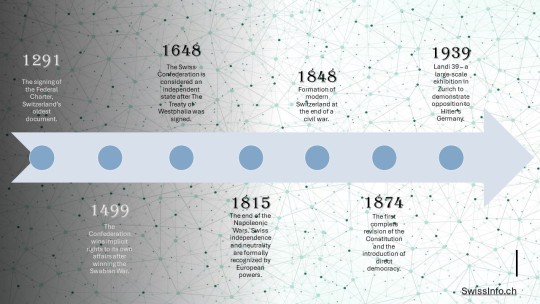
Switzerland is famous for its neutrality, breathtaking landscapes, and diverse cultural heritage. Its history is a fascinating journey filled with pivotal moments that have shaped the nation’s unique identity. In this post, we’ll explore three key historical events: the signing of the Federal Charter in 1291, the recognition of Swiss independence and neutrality in 1815, and the Landi ‘39 exhibition in 1939. Each of these events influenced how the Swiss perceive themselves and others, molding their cultural values and goals. Let’s dive in and uncover these exciting chapters in Swiss history!
1291: The Signing of the Federal Charter
Let’s start our adventure in 1291, a cornerstone of Swiss history. The Federal Charter, signed by the cantons of Uri, Schwyz, and Unterwalden, is considered Switzerland’s oldest document and marks the birth of the Swiss Confederation (SwissInfo.ch).

Perceptions, Behaviors, and Attitudes:
The signing of the Federal Charter was like planting a seed of unity among the Swiss cantons (The Federal Council). This early alliance set the stage for a culture of solidarity and self-reliance, which persists to this day! The Swiss developed a healthy dose of caution towards external powers, preferring to manage their own affairs. This cautious yet respectful view of other cultures has persisted (still to this day), and shaped Switzerland as a nation that values its independence while also embracing peaceful coexistence and trade.
Cultural Values, Goals, Expectations, and Identity:
The Federal Charter laid the foundation for some of Switzerland’s core values: direct democracy, federalism, and neutrality. These principles have become deeply embedded in Swiss identity. The Charter’s emphasis on collective security and self-governance translated into a national ethos of civic responsibility and local control. Even today, Switzerland’s political system, with its frequent public votes and local decision-making, reflects these cherished values (The Federal Council).
1815: Recognition of Swiss Independence and Neutrality
Fast forward to 1815, a year that was a complete game-changer for Switzerland. The end of the Napoleonic Wars brought about the Congress of Vienna (Britannica), where European powers formally recognized Swiss independence and perpetual neutrality (SwissInfo.ch).
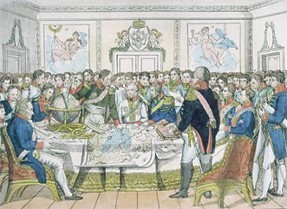
Perceptions, Behaviors, and Attitudes:
This official stamp of neutrality allowed Switzerland to carve out a unique position in Europe. The Swiss became known as skilled diplomats and humanitarians, offering a safe haven and mediating international disputes. This reputation for neutrality fostered an inclusive and open-minded attitude toward foreigners, creating a society that values peace and stability over territorial ambitions (About Switzerland).
Cultural Values, Goals, Expectations, and Identity:
Neutrality became a defining feature of Swiss identity, influencing the nation’s foreign policy and international standing (About Switzerland). Values such as impartiality, non-intervention, and humanitarianism took center stage. These principles have guided Switzerland throughout history, for example hosting international organizations like the Red Cross and various United Nations agencies. The commitment to neutrality has instilled a strong sense of national pride and unity, which showcases Switzerland as a small yet influential player on the global stage.
1939: Landi ‘39 Exhibition
Now, let’s hop over to 1939, a year when Switzerland hosted the grand Landi ‘39 exhibition in Zurich. This event was an amazing showcase of Swiss innovation, culture, and resilience, set against the backdrop of the looming threat from Nazi Germany (SwissInfo.ch).

Perceptions, Behaviors, and Attitudes
Lande ‘39 was a confidence booster for the Swiss, highlighting their technological achievements, cultural heritage, and military preparedness. It fostered a sense of unity and national pride, reinforcing the belief in Switzerland’s ability to remain neutral and self-sufficient. The exhibition was a bold statement of Swiss cultural pride and a clear signal to neighboring countries that Switzerland intended to maintain its distinct identity and commitment to peace (American Helvetia Philatelic Society - Unifying the Swiss with War Looming).
Cultural Values, Goals, Expectations, and Identity:
The exhibition solidified Switzerland’s dedication to neutrality and independence, which embedded those values deeper into the national consciousness. It emphasized the importance of self-reliance, technological progress, and cultural preservation (The National Exhibition of 1939). The event also highlighted the role of unity and preparedness in national security, shaping their expectations of civic duty with an emphasis on defense. This period marked a blend of traditional customs with modern advancements, forging the resilient and forward-thinking Swiss identity.
Conclusion
Switzerland’s cultural history is like a vibrant tapestry woven from pivotal moments that have shaped the nation’s identity and values. The signing of the Federal Charter in 1291, the recognition of independence and neutrality in 1815, and the Landi ‘39 exhibition in 1939 are all key events that have defined Swiss perceptions, behaviors, and cultural values. These moments have collectively contributed to a national ethos characterized by unity, neutrality, self-reliance, and humanitarianism. Exploring these historical milestones gives us a glimpse into the unique and alluring cultural identity of Switzerland.
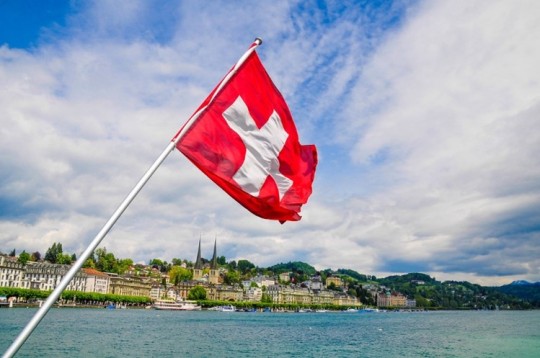
0 notes
Text
The Essence of Marketing: A Journey Through Time and Strategies
Unraveling the Threads of Marketing
Marketing, at its core, is the art and science of connecting with people, understanding their needs, and presenting solutions that make a difference. It's not just about selling but creating relationships, building trust, and fostering a sense of value. The evolution of marketing is a fascinating tapestry woven through time, adapting to the ever-changing landscapes of technology, society, and commerce.
Evolution of Marketing: A Historical Odyssey
Traditional Marketing (Pre-20th Century): Before the digital age, marketing primarily unfolded through print, billboards, and word of mouth. Local markets thrived on personal connections, where the community played a crucial role in spreading the word about products.
Mass Marketing (20th Century): The industrial revolution birthed mass production, giving rise to mass marketing. Radio, television, and newspapers became powerful tools to reach a broader audience. Brands began creating universal messages to appeal to the masses.
Digital Marketing (21st Century): The advent of the internet reshaped the marketing landscape. Digital platforms, social media, and e-commerce opened new avenues for businesses to connect directly with their target audience. Personalization and data-driven strategies became key players.
Types of Marketing: A Diverse Palette of Strategies
Content Marketing: Sharing valuable content to attract and engage the target audience, building trust and brand loyalty.
Social Media Marketing: Leveraging platforms like Facebook, Instagram, and Twitter to connect with audiences, create brand awareness, and drive engagement.
Influencer Marketing: Collaborating with influencers or individuals with a significant following to promote products or services.
Email Marketing: Direct communication through email to nurture leads, share updates, and build relationships with customers.
Search Engine Optimization (SEO): Enhancing online visibility by optimizing content for search engines, improving organic search rankings.
Affiliate Marketing: Partnering with individuals or businesses to promote products, earning commissions for sales generated through their efforts.
Importance of Marketing: Weaving the Fabric of Business Success
Visibility and Brand Awareness: Marketing ensures that your business is seen and recognized in a crowded marketplace, establishing a strong brand presence.
Customer Acquisition: Effective marketing strategies attract new customers, expanding the customer base and driving business growth.
Customer Retention: Building lasting relationships through marketing efforts fosters customer loyalty, encouraging repeat business.
Market Research: Marketing involves understanding customer needs, preferences, and trends, providing valuable insights for business decisions.
Revenue Generation: Ultimately, successful marketing translates into increased sales and revenue, sustaining the financial health of a business.
In the ever-evolving landscape of commerce, marketing remains a dynamic force, continuously adapting to new technologies, consumer behaviors, and societal shifts.
Career Fortune institute in pune is your launching pad for a rewarding digital marketing career! Their Pay After Placement Digital Marketing Course is crafted with your success in mind, offering a personalized and practical approach to learning. The faculty are not just instructors; they're mentors dedicated to guiding you. In today's business landscape, digital marketing is paramount. Their advanced curriculum goes beyond the basics, immersing you in practical skills essential for navigating the dynamic digital realm. Imagine landing roles in well-known companies – a reality facilitated by their extensive network, opening doors to exciting opportunities and laying a solid foundation for your career.
What truly sets them apart is their100% Job Guarantee. It's not just a promise; it's a commitment to ensuring a seamless transition from learning to a fulfilling career, instilling confidence in your step into the professional world. Concerned about the financial side? Opt for the Pay After Placement in Pune, allowing you to prioritize learning and pay fees only after securing a job.Recognizing diverse learning preferences, they offer both online and offline classes. Whether you favor the flexibility of online learning or the traditional classroom setup, they adapt to your needs.

#Payafterplacementcourse#digital marketing#digital marketing courses#digital marketing course#pay after placement digital marketing#Pay after placement#pay after placement in pune#pay after placement pune#pay after placement courses in pune#digital marketing courses in pune
0 notes
Text


BASICS
Name: Conor Dempsey
Age & Birthday: 34, March 13,1990
Gender/Pronouns: cis woman, she/her
Birthplace: Salem, MA
Time in Hollow Cove: x
Species: Fire-Witch, Not-Dempsey Coven.
Role: Runner, Patrol
Positive personality traits: Assertive, Determined, Resilient
Negative personality traits; Combative, Blunt, Cynical
ABOUT
Conor grew up in an old, dark coven led by her mother Ophelia who was corrupted with power and perversions of magic. Despite Blair's best attempts to shield her and their brothers from their mother's and coven's darkness, each of them fell into their own ways of coping. Like Blair, Conor's was the bottle. Finding solace in the pleasant buzz it brought to her life, even if it did make her magic a bit more unpredictable.
When Blair finally got them out, Conor was still a teenager, and though she followed her sister, she, like her brothers, pulled their own weight. They were ruffians, street rats, doing their best to get by together. But they were together, and that's what mattered.
Conor was always vocal when she disagreed with a decision, or when she thought her siblings were being dumb, but she loved them to pieces, even if her way of showing it was snagging a few mini bottles from the cash register of the local wine and spirits. She was there when they detoxed Trick, and burned through her sleeves, tangling them into knots as she listened to his agony.
Blair pulled them through the worst of it, and provided for them what their mother and coven never could. Conor was never as talented with her words as she was with her art. She transferred the darkness of their past to canvas in a way that helped her process the pain of what they'd gone through.
Their coven-not-coven became an odd family of sorts, and though Conor remained closest to her siblings, though not without the typical sibling bickering, she found people fascinating subjects to translate into art. Everyone who came through had a dark past and the walls of a spare room in their house was covered in her work. She'd spend hours working, listening to podcasts on aliens and other conspiracy theories, as well as random pods about herbology, focused on growing odd plants, with the help of some of the earth witches around.
When the war broke out, they managed to stay under the radar for a bit before having to make a run for it themselves. It's not been an easy journey, but it's made easier (and sometimes more difficult) by the fact she's with her siblings as they search for their other not-coven members.
0 notes
Text
Beyond the Buzz: Navigating the Intersection of Viral News and Global Business

While "best" is subjective, the intersection of viral news and global business news presents a fascinating and dynamic landscape. From innovative startups gaining traction through viral campaigns to the impact of social media on consumer trends, understanding this interplay can be insightful for both businesses and consumers.
Decoding the Viral Buzz: Capitalising on Attention, Not Hype
Understanding the Trend: Analyse the core message and its potential appeal to specific audiences. Not all viral trends translate to business success.
Authenticity Matters: Avoid gimmicks and focus on genuine brand values and storytelling to build trust and engagement.
Data-Driven Decisions: Track the impact of viral campaigns on key metrics like brand awareness, website traffic, and sales conversion.
Navigating the Hype Cycle: Be prepared for the fleeting nature of viral trends and have a long-term strategy in place.
Examples:
A quirky social media dance challenge by a clothing brand sparks initial buzz, but a well-crafted follow-up campaign highlighting sustainable practices leads to long-term brand loyalty.
A viral video showcasing a local bakery's unique pastries attracts tourists, but the bakery invests in scaling production and online sales to sustain success.
Examining Global Business News: Beyond Headlines, Seeking Insights
Diversify Your Sources: Rely on reputable news outlets and financial publications from different regions to gain a global perspective.
Focus on Trends, Not Noise: Analyse long-term economic and political trends, not just short-term market fluctuations.
Understanding the Impact: Consider the implications of business news on different stakeholders, including employees, consumers, and the environment.
Seek Expert Analysis: Look for insights from economists, industry analysts, and other experts to understand the deeper context behind the news.
Examples:
An analysis of rising inflation in one region should be considered alongside global economic trends and potential policy responses from different governments.
A news report about a new trade agreement should explore its impact on local businesses, jobs, and the environment in both countries involved.
Remember: Both viral news and global business news are valuable tools, but critical thinking is essential. Look beyond the hype and sensationalism, and seek credible sources, diverse perspectives, and in-depth analysis to make informed decisions and understand the complex interplay between business and society.
To know more about the best viral news, or best world business news, we recommend you to visit the Xreporter, as it is the best world viral news
0 notes
Text
AI in the Hotel and Tourism Industry
Introduction
In recent years, artificial intelligence (AI) has emerged as a game-changer in various sectors, and the travel and hospitality industry is no exception. From streamlining hotel operations to enhancing the travel experience, AI is revolutionizing the way we explore the world. In this blog, we'll delve into the fascinating realm of AI in travel, focusing on its application in hotels and tourism. We'll explore how AI is transforming these sectors, offering improved efficiency, personalization, and customer satisfaction.
AI in Hotels: Streamlining Operations and Enhancing Guest Experiences
1. **AI Hotel Management Systems**
AI-powered hotel management systems have become a cornerstone of the industry. These systems optimize room bookings, housekeeping, and maintenance schedules. They also assist with revenue management by adjusting prices based on demand and availability. This not only leads to more efficient operations but also maximizes revenue for hotels.
2. **Chatbots for Customer Service**
AI-driven chatbots are increasingly prevalent in the hospitality sector. They provide instant responses to guest inquiries and requests, offering a personalized experience. Chatbots can help guests with information on hotel services, local attractions, and even room service orders. They are available 24/7, improving the overall guest experience.
3. **AI in Housekeeping**
AI is making housekeeping operations more efficient. Robots equipped with AI technology can clean rooms and deliver amenities, reducing the time required for manual tasks. This not only enhances guest satisfaction but also allows staff to focus on more complex tasks.
AI in the Travel Industry: A Seamless Journey
1. **Personalized Travel Recommendations**
The travel industry uses AI algorithms to analyze travelers' preferences and past behaviors to suggest personalized itineraries. From choosing destinations to recommending activities, AI can tailor travel plans to individual preferences, creating a more enjoyable and memorable experience.
2. **AI-Powered Booking Platforms**
Online booking platforms now leverage AI to provide travelers with tailored suggestions based on their previous bookings and browsing history. This level of personalization simplifies the decision-making process and saves time for travelers.
3. **Enhanced Security and Safety**
AI is also employed to enhance security and safety in the travel industry. It helps detect potential threats and improves airport security measures. For instance, AI-powered facial recognition systems can expedite the check-in and boarding processes while ensuring a secure environment.
AI in Hotel and Tourism: Transforming the Guest Experience
1. **Voice Assistants in Hotel Rooms**
AI voice assistants, like Amazon's Alexa or Google Home, are now a common feature in hotel rooms. These devices allow guests to control room settings, request information, and even order room service through voice commands, creating a more convenient and connected experience.
2. **Smart Room Control**
AI systems can adjust room settings such as lighting, temperature, and entertainment options based on guest preferences. This not only enhances comfort but also reduces energy consumption, contributing to sustainability efforts.
3. **Real-time Translation Services**
AI-powered translation apps and devices are breaking down language barriers for tourists. Travelers can communicate more effectively with locals, enhancing their cultural immersion and overall experience.
The Future of AI in Travel and Hospitality
AI's role in the travel and hospitality industry is continuously evolving. As technology advances, we can expect even more innovative applications of AI, such as the use of augmented reality (AR) and virtual reality (VR) to provide immersive experiences, predictive maintenance for hotels to prevent equipment failures, and enhanced data analytics to better understand customer preferences and market trends.
Conclusion
AI is redefining the way we travel and experience the world. In the hotel and tourism sectors, it enhances efficiency, personalization, and safety. From AI-powered hotel management systems to personalized travel recommendations, AI is making travel more enjoyable, convenient, and secure. As technology continues to advance, we can anticipate even more exciting developments in AI's role in the travel and hospitality industry. So, whether you're checking into a smart hotel room or receiving personalized travel recommendations, AI is your trusty travel companion, ensuring your journey is nothing short of extraordinary.
0 notes